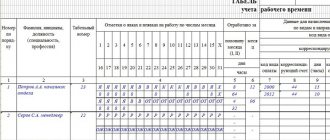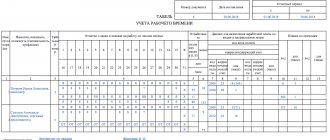The activities of many employees employed in various labor sectors involve business trips. There are regulations that define the procedure and rules for sending employees on business trips.
Dear readers! The article talks about typical ways to resolve legal issues, but each case is individual. If you want to find out how to solve your particular problem , contact a consultant:
+7 (499) 938-81-90 (Moscow)
+7 (812) 467-32-77 (Saint Petersburg)
8 (800) 301-79-36 (Regions)
APPLICATIONS AND CALLS ARE ACCEPTED 24/7 and 7 days a week.
It's fast and FREE !
One of the important issues that arise when arranging a business trip is related to working hours.
Every employer is required to keep such records. Special timesheets are provided for this. Similar documents must be prepared every month for all departments of the enterprise.
Working time is the time interval when an employee, based on the terms of the contract with the employer, performs the powers assigned to him.
Each day, the employer must note on the time sheet the number of hours actually worked by each employee during his shift or working day. Also in this document, the employer is obliged to indicate the employees’ rest days, absenteeism, time on vacation, etc.
In some cases, filling out the timesheet is controlled by the enterprise’s personnel service.
Legislation
Article 91 of the Labor Code of the Russian Federation gives the concept of working time and establishes that the employer is obliged to maintain it.
To display the time actually worked by an employee, in 2021 the forms of time sheets approved by Resolution No. 1 are used. They are designated T-12 and T-13.
The Ministry of Labor in its letter No. 14-2-291 established that the days of an employee’s business trip should be indicated in the relevant document by code “K” or “06”.
The number of hours actually worked is not entered. This is due to the fact that the employer is physically unable to take into account working hours during employee business trips.
If, during a business trip, an employee was involved in work on his day off, then this day must be designated in the report card as “RV” or “03”.
Working hours on a business trip
Many employers are interested in whether there is working time during a business trip. According to the definition, at this time the employee, based on the terms of the contract with the employer, must perform his own job duties.
Since on a business trip the employee is not engaged in the performance of work duties, but is working on a job assignment, this period does not apply to working time.
However, the employer must still display it on the time sheet.
On weekends and holidays
An employee on a business trip is subject to the work and rest time schedule provided for at the place of business trip.
However, the average earnings are retained for all working days of the employee according to the schedule of the main place of work.
This means that the employee rests on a business trip on those days that are set as days off by the new employer.
If an employee was sent on a business trip on his legal day off, then after returning from it he is given an extra day of rest or monetary compensation.
Weekends and holidays that fall while the employee is on a business trip are marked by the employer on the timesheet as days off in accordance with the adopted local regulations[/anchor].
For example, weekends that fall during a business trip are usually designated by the letter “B”. If an employee worked on his legal day off, then the code “RV” is entered.
Duration
The employer does not set the standard length of his working day for a posted employee. It must be determined by the employee independently, based on the complexity and nature of the official assignment.
When determining the length of the working day, the employee must be guided by the goal of completing the assigned task during the business trip.
However, if an employee fails to complete a work assignment during a business trip, the employer may increase the duration of the trip or require overtime work.
Payment for a business trip on a holiday is increased. How is sick leave paid on a business trip? See here.
Overtime work
Overtime work during a business trip is an excess of daily work hours over the number of working hours established at the employee’s workplace.
Overtime work during business travel is not subject to the labor law provisions that apply to normal overtime work.
What privileges can be applied to an employee if he is involved in such work on a business trip:
- increased pay for additional hours;
- providing additional rest;
- increasing an employee’s vacation by adding additional days;
- payment of a special bonus for overtime work.
Any organization may introduce additional incentives for working beyond normal limits during a business trip.
If the working days of a business trip are indicated in the time sheet by the letter code “K”, then the days of overtime work can be indicated as “SK”.
Question No. 4
How much should I pay for an employee to go on a business trip on a day off?
If the day of departure (arrival) on a business trip (from a business trip) is a day off or a non-working holiday, then payment for work on this day is made based on the employee’s official salary, and not on the basis of average earnings.
According to clause 5 of Regulation No. 749, remuneration for an employee if he is involved in work on weekends or non-working holidays is made in accordance with the Labor Code of the Russian Federation. Therefore, to determine the amount of remuneration on specified days during a business trip, employers should be guided by Art. 153 of the Labor Code of the Russian Federation, which states that wages are paid at least double the amount.
The specific procedure for calculating it depends on the employee remuneration system used, in particular:
- employees receiving a salary (official salary) - in the amount of at least a single daily or hourly rate (part of the salary (official salary) for a day or hour of work) in excess of the salary (official salary), if work on a day off or a non-working holiday was carried out on within the monthly working hours;
- in the amount of no less than double the daily or hourly rate (part of the salary (official salary) for a day or hour of work) in excess of the salary (official salary), if the work was performed in excess of the monthly working time standard.
In addition, specific amounts of remuneration for work on a day off or a non-working holiday can be established by a collective agreement, a local regulatory act adopted taking into account the opinion of the representative body of employees, or an employment contract.
Increased payment is made to all employees for hours actually worked on a weekend or non-working holiday.
If part of the working day (shift) falls on a weekend or non-working holiday, the hours actually worked on the weekend or non-working holiday (from 00.00 to 24.00) are paid at an increased rate.
Similar explanations are given in letters of the Ministry of Labor of the Russian Federation dated July 9, 2019 No. 14-2/B-527, Rostrud dated October 16, 2019 No. PG/26391-6-1, dated October 16, 2019 No. TZ/5985-6-1.
At the same time, at the request of an employee who worked on a holiday, he may be given another day of rest. In this case, work on such a day is paid in a single amount, and a day of rest is not subject to payment.
Accounting
According to the Labor Code of the Russian Federation, working time on a business trip must be recorded from the moment the employee leaves until the day of his return, inclusive. Accounting is carried out in days.
Business travel days must be displayed by the employer on the time sheet in accordance with the conventions used for such documents. They are contained in the Regulations on Timesheets of Working Time.
Reflection in the report card
The timesheet must display each day of the employee’s business trip. This document will subsequently be used by the chief accountant to calculate salaries and bonuses to employees.
Most often, the days of an employee’s business trip are indicated by letter codes:
- “K” – business trip;
- “RW” - work on days off;
- "On a weekend;
- "SK" - overtime work during a business trip.
Sometimes when filling out a timesheet for a posted employee, the designation “B” is used. This can be used to mark employee sick days. The type of payments that will need to be given to the employee will depend on which letter appears on the time sheet - “K” or “B”.
In the first case, travel allowances are paid, and in the second, sick leave. An employee cannot be on a business trip and on sick leave at the same time.
We can give two examples of situations:
- The employee fell ill before the start of a business trip, and the order to be sent on a business trip had already been issued. An employee on sick leave cannot be forced to go on a business trip, but he can go on it of his own free will. However, if an employee closes his sick leave before a business trip, then its days will be marked in the time sheet with the letter code “K”.
- An employee fell ill while on a business trip. In this case, the days of his sick leave are marked with code “B”. In this case, it is considered that the employee interrupted the performance of his work assignment due to illness. Decor
The employer can use both the T-13 and T-12 time sheet forms. In the first case, the document is filled out by hand, and in the second - in an automated way. In practice, most organizations continue to use the T-12 form.
A sample of the T-12 working time sheet is here,
A sample time sheet, form T-13, is here.
Regardless of what form of timesheet is used, this document must contain the following information:
- Title of the document;
- date of compilation;
- name of the enterprise;
- columns where the attendance or absence of employees is displayed;
- working hours in days or hours;
- Full name and position of employees;
- Full name and position of the person responsible for maintaining the time sheet;
- signatures of authorized persons.
A document is considered valid only if all relevant details are present in its form.
Counting days and hours of work in various situations
During the business trip, in addition to money to compensate expenses, the employee receives a salary, which is calculated based on his average earnings.
On business trip days, o is displayed on the report card, but additional signs may be added to it, used to indicate special situations.
Calculation of travel time
It is considered that a person is on a business trip from the day and hour indicated on the plane, train or bus ticket that takes him to his destination.
If an employee goes on a business trip in the evening of the same day that he spent at work, a note is made on the report card indicating that he worked the required 8 hours. To this is added overtime time spent on:
- Travel to the departure station;
- Registration and boarding;
- Staying on the road;
- Directions to the hotel at the final destination.
If there is a delay in transit due to unfavorable weather or the fault of the transport company, overtime work time increases. If the hours of forced downtime occur on weekends, the employee on a business trip receives a double salary.
The issue of an employee’s appearance at work on the day of departure on a business trip or on the day of his return is decided individually by agreement with management.
Travel tickets confirming the duration of travel are submitted to the accounting department along with receipts for expenses.
The multifunctional DLP system SearchInform CIB helps you see who is doing what during working hours.
Employee work schedule when there are differences in operating modes of enterprises
Often, the labor regime of the enterprise to which the employee is posted does not coincide with the regime existing at the place of his main service. In such a situation, the choice of traveler's working hours usually depends on the nature and scope of the work assignment. When sending an employee on a business trip, management can stipulate his work schedule in advance. Time is allotted to complete the task, and at the same time the need to pay for labor at odd hours is eliminated. In this case, the management’s order is issued in the form of an order (Form T-9a).
If the employee does not receive special instructions regarding the work schedule, he makes the decision independently. In this case, the traveler takes into account the work schedule of the receiving organization, which provides him with materials to complete the task.
It is impossible to accurately record the working time of an employee sent on a business trip at his main place of work. The timesheet shows code “K” (or 06), but working hours are not indicated.
How is work on weekends and holidays taken into account?
If an employee who is abroad for work is forced to work on days that are holidays and weekends in Russia, the code “РВ” (or 03) is entered in the working time sheet instead of code “B”.
However, in fact, a person rests on those days that are non-working at the enterprise at the place of arrival.
If the date of departure on a business trip coincides with a day off, the employee is given an additional day of rest, or is given monetary compensation after returning from a business trip.
Control of overtime hours and night work
Sometimes, in order to complete a work assignment on time, an employee sent on a business trip requires additional working time (for example, to be present during important experiments).
There are no strict legal provisions regarding overtime work on a business trip. In agreement with the management entrusting the employee with the performance of a work task, when accounting for working hours, the entry “SK” (instead of “K”) is made in the timesheet, and the overtime is recorded. Permission to work overtime is formalized by an order that specifies the permissible excess time. It is also possible to receive a verbal order.
The following privileges may be provided as incentives:
- Additional payment for working hours, which in accordance with the employment contract is made in the amount of 1.5-2 times;
- Providing time off for overtime;
- Adding days of overtime work to the next vacation;
- Payment of a special bonus.
If the enterprise at the place of business trip uses a shift work schedule, then the employee performing a job assignment has to work not only during the day, but also at night. In this case, an order must be issued specifying the need for such work. 20% of the salary is added to the payment for each hour of night working time.
How is sick leave taken into account?
If an employee on a business trip gets sick and provides sick leave, then on his report card the days of illness are marked with o instead of “K”. Payment for business travel and sick days is carried out differently. It is not possible to receive travel and sick pay at the same time.
The following situations may arise: An order to go on a business trip was issued, but the employee fell ill before departure. Depending on the severity of his condition, the trip may be canceled or postponed;
- The employee fell ill after the order to be sent on a business trip was issued, but agreed to go on it of his own free will. If he closed his sick leave before departure, then on the days of the trip the note “K” is placed on his report card;
- The illness overtook the employee while he was on a business trip, as a result of which the work assignment had to be postponed for a certain period. The timesheet is marked o, travel allowances are calculated taking into account days of illness, the reason for the delay is indicated in the report on the business trip.
If a business trip overlaps with a vacation
In some cases, there is an urgent need to send an employee on vacation (with his consent) on a business trip. Departure on a business trip can take place after his return home or directly from his vacation spot. On days when vacation is interrupted, the code “K” is entered in the timesheet instead of o. The salary is calculated taking into account additional travel and compensation for unspent vacation days.
If an employee is forced to take leave during a business trip, this is also reflected in the order and in the report card.
***
The working time spent by an employee sent on a business trip to perform a job assignment is taken into account at the place of his main job. Marks are made daily on the accounting sheet using the code “K” and other designations reflecting the time of overtime, illness and the occurrence of other situations. The time sheet is used when calculating wages, the amount of which is calculated based on the average daily earnings for the previous year.
20.01.2021
Payment
During a business trip, an employee does not receive a salary, but an average salary. It includes a variety of bonuses and allowances, so the rate for an employee on a business trip may be even higher than his regular salary.
In addition to the average salary, during a business trip the employer is obliged to pay the employee a daily allowance.
The minimum amounts for these payments are provided - 700 rubles per day for business trips in Russia and 2,500 rubles per day for business trips abroad.
Such amounts are not subject to personal income tax, so employers are not recommended to accept larger daily allowances for employees.
However, at his own discretion, the employer has the right to increase the amount of daily allowance, but in this case the amounts will be subject to personal income tax in full.
Salary on a business trip is mandatory. How to apply for a business trip extension? Information here.
What documents are required for a business trip using personal transport? Details in this article.
Reimbursement
Based on labor legislation, the employer is obliged to reimburse the employee for expenses associated with renting housing during a business trip, travel to and from the destination, as well as other types of expenses.
For delays in transit, the employee also has the right to demand payment - double the amount if it occurred on a weekend, and at the regular rate - for delays on weekdays.
In order to confirm the existence of expenses, the employee must provide the employer with checks, receipts and other documents from the trip.







